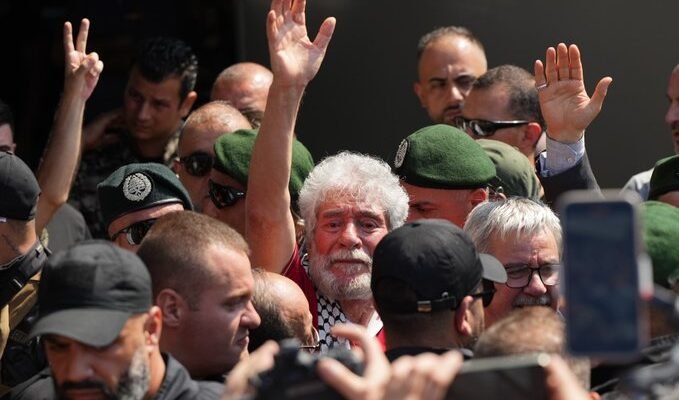BEIRUT, LEBANON – In a development that has reawakened fiery international debate, Lebanese militant Georges Ibrahim Abdallah, who has spent more than four decades in prison in France, returned to Lebanon on July 25, 2025, after being released following a ruling by the Paris Court of Appeal. His release marks an end to a 41-year incarceration for his role in the 1982 Paris murders of American military attaché Charles R. Ray and Israeli diplomat Yacov Barsimantov.
Now 73, Abdallah was one of the longest-sitting political prisoners in Europe. His release was greeted by many in Lebanon and the Arab world as a much-delayed act of justice, but angrily condemned by the United States and Israel, which had for decades urged France to jail him.
Georges Ibrahim Abdallah was a founder of the Lebanese Armed Revolutionary Factions (LARF), an anti-imperialist Marxist, pro-Palestinian group active in the early 1980s. Abdallah was arrested in Lyon, France, in 1984 and convicted in 1987 to a life prison term for his involvement in the politically motivated killings of the American and Israeli officials in 1982 killings that occurred during increased international tension as a result of the Israeli invasion of Lebanon.
Throughout his detention, Abdallah never abandoned his political ideology. He identified himself as a revolutionary in anti-imperial and anti-Zionist movements. His supporters argued that he was a prisoner of conscience, while his detractors blamed him as a terrorist.
Even as eligible for parole since 1999 under French law, Abdallah remained in prison for more than 26 additional years due to mostly American and Israeli diplomatic pressure. The United States government repeatedly lobbied against his release on the grounds of the murder of an American official and his persistent ideological stance.
The Court of Appeal in Paris’s decision to release him was greeted as a “strictly legal” one based on time served and his uninterrupted record of good behavior. The order of expulsion along with immediate deportation from French soil was one France had long delayed citing Lebanese uncooperativeness.
However, the Lebanese government had already issued travel documents beforehand, paving the way for Abdallah’s deportation at once the court ruled. He was deported from Paris to Beirut, and there he was greeted as a hero by the leftist groups, Palestinian activists, and political allies.
To his supporters in Lebanon and other parts of the Arab world, Abdallah is not a fugitive but a leadership figure of resistance who spent his life defending victimized individuals, particularly the Palestinians. His return was met with triumph demonstrations, solidarity slogans, and triumph flags over imperialism.
Lebanese politician and Hezbollah supporter Assem Qanso described his release as “a victory for all who struggle for justice in the face of colonial occupation.” Pro-Palestinian associations in the Middle East and Europe also shared this view, congratulating Abdallah on never giving way on his principles for over four decades behind bars.
By contrast, US and Israeli officials were outraged and dismayed. A US State Department spokesman condemned the move: “The release of Georges Abdallah is an affront to the memory of American and Israeli victims of terrorism. It’s a denied justice.”
Israel’s Foreign Ministry put out a statement condemning the action, calling it a “dangerous message of impunity” for perpetrators of political violence.
Abdallah’s release is going to put strain on already strained Western relations with Lebanon and large parts of the Middle East. While the French administration upheld that the judiciary is impartial and the release a question of legal process, critics argue that France should have taken geopolitical considerations into account.
Human rights campaigners, however, welcomed the decision, citing fears over political interference in judicial matters. Amnesty International claimed that “no one should be detained indefinitely due to diplomatic pressure after they have served their sentence in accordance with the law.”
In brief remarks on arrival in Beirut, Abdallah thanked his supporters and reiterated himself to “the struggle for justice and liberation.” Though frail in body, he appeared stubborn and mentally strong, refusing to respond to queries from Western correspondents but thanking “all those who stood with me for the past 41 years.”
It’s not yet certain what place Abdallah will have in Lebanese politics or activism in the future, but his legacy is secure whether that of revolutionary icon or convicted murderer.
The release of Georges Ibrahim Abdallah is a moment for introspection for the international community. It raises tough questions about justice, diplomacy, ideology, and where the lines are drawn between resistance and terror. To some, he’s a symbol of resistance to tyranny. To others, a reminder of lives lost to bloodshed.
But after 41 years, it is obvious that his name will continue to generate furious passions on both sides of the political divide.
Georges Ibrahim Abdallah Freed After 41 Years: A Controversial Chapter in Global Politics Ends



